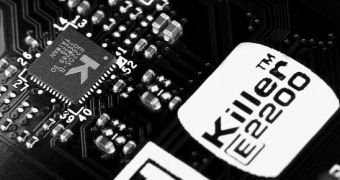Micro-Star International is about to give the letter “G” a new connotation, one more or less diametrically opposed to the one that Advanced Micro Devices conferred upon it when it released the G-Series APU and supporting motherboards.
That is to say, while AMD uses G-Series to talk about low-end accelerated processing units made for embedded systems, MSI will use G-Series to refer to its high-end gaming mainboards.
Through a collaboration with Qualcomm, MSI gained the use of the Atheros Killer E2205 Gigabit Ethernet network adapter that gives games priority when dividing bandwidth.
“We are truly excited to cooperate with Qualcomm Atheros on the implementation of their unique technology on our soon to be announced gaming motherboards,” said Ted Hung, vice president MSI motherboard department.
“This puts MSI in the driver’s seat for gaming motherboards with a balanced lineup that hits all critical price-points for gamers.”
The network card is just a perk though, one that will only act as a brownie point for an already powerful platform.
Specifics will be shared whenever a new G-Series motherboard arrives, but it is clear enough that all of them will have powerful, overclockable CPUs, a high memory capacity potential and abundant connectivity capabilities.
MSI doesn't really have a choice in the matter really, if it is to directly compete with the likes of ASUS Republic of Gamers of ASRock's Fatal1ty family.
On that note, MSI will include MSI Gaming Device Ports, even a PS/2 port with up to 1000Hz polling rate for advanced mice. While USB can be used just fine for peripherals, many mice and keyboards still employ PS/2.
Over the next few months, MSI will launch G-Series motherboard in preparation for Intel's Haswell CPUs, which are set for a June release. Given the comparison benchmark with Ivy Bridge, there is no question that the 4th generation Core Series are what the company is getting ready for.

 14 DAY TRIAL //
14 DAY TRIAL //